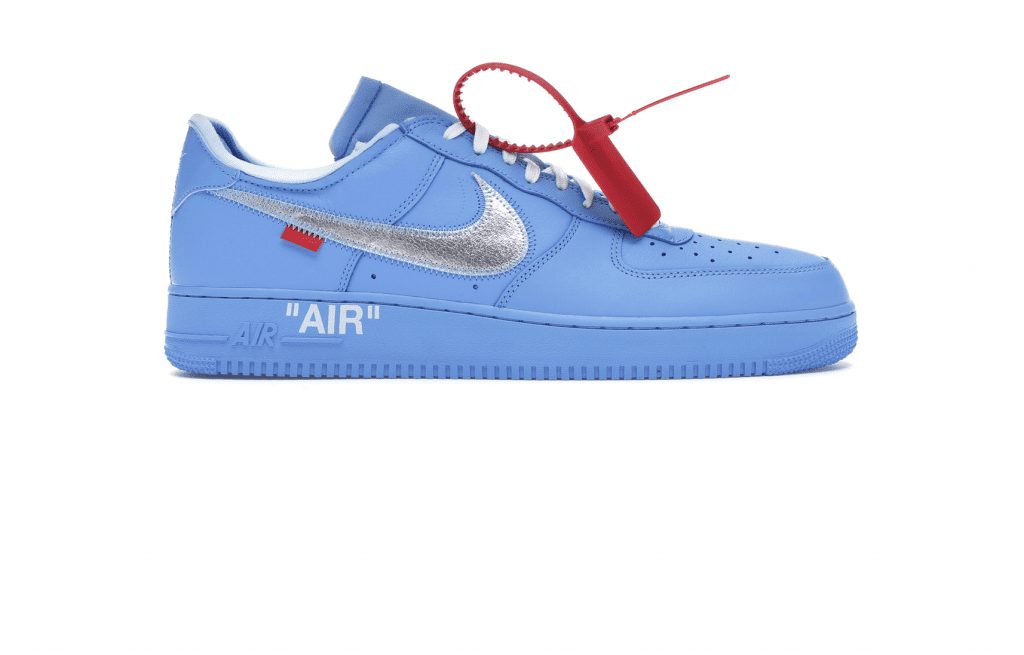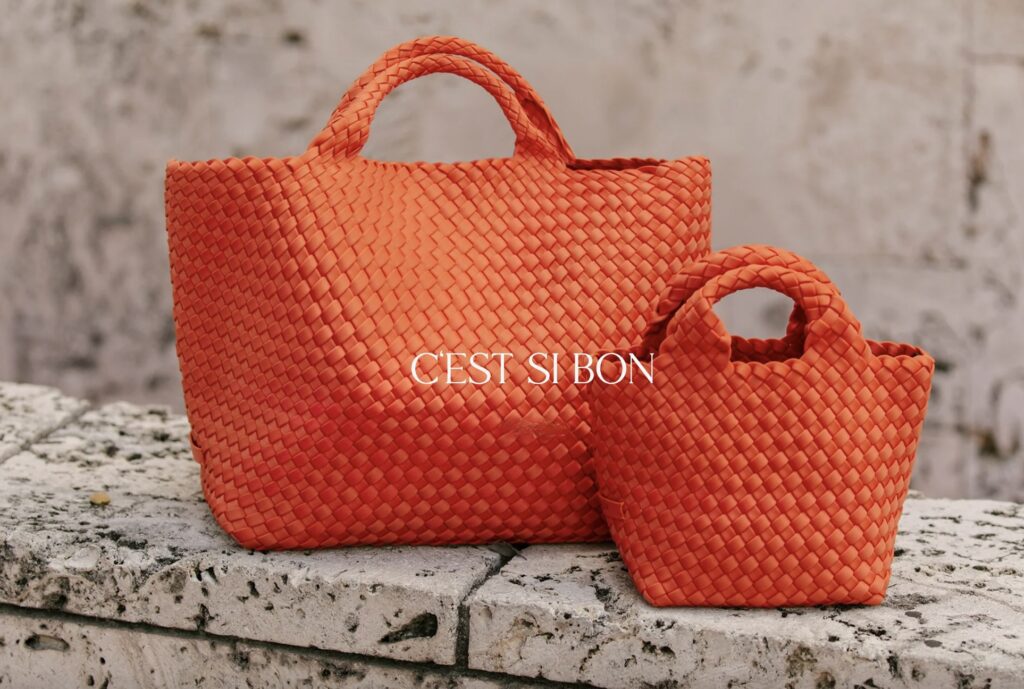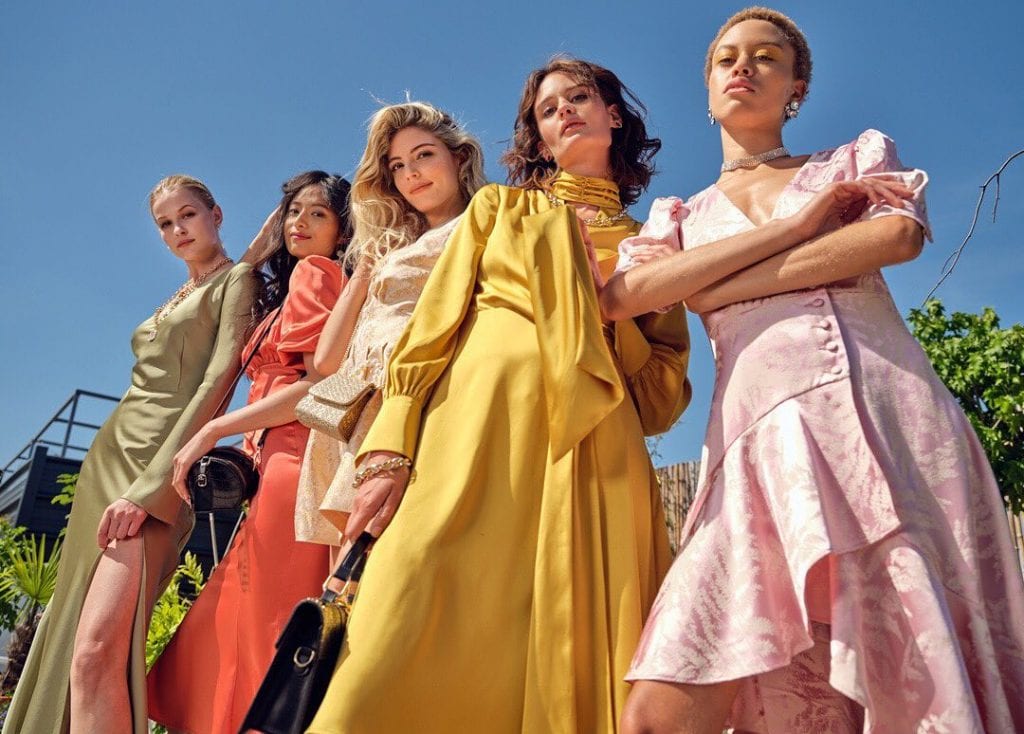In May 2019, in the midst of filing upwards of 100 trademark applications for registration in the U.S., alone, since its launch several years prior, Off-White lodged an interesting application with the U.S. Patent and Trademark Office (“USPTO”). In furtherance of that application, counsel for the buzzy streetwear brand claims exclusive trademark rights for the words “Product Bag” along with the quotation marks surrounding the words in connection with its use of the quotation mark-flanked term on clothing, namely “tops [and] bottoms.” In short: Off-White is essentially asserting that when consumers see “Product Bag” on clothing, they link those products with a single source.
Off-White’s quest for a registration – and the nation-wide benefits that come with it – for “Product Bag” follows from its continued (and well-publicized) use of quotation marks on a wide array of goods, with such use dating back to 2016, according to that trademark application, which is still pending before the USPTO. Those uses range from Off-White branded accessories and Nike collaboration sneakers to Ikea furniture (and corresponding signage at one of the Swedish retailer’s outposts) and Evian bottles, among other things.
While trademark law is, in fact, capable of protecting “any word, name, symbol, device, or any combination thereof, used to identify and distinguish the goods/services of one seller from those of others,” including, punctuation marks, Off-White’s attempt to garner federal protection – by way of a trademark registration – is a striking one that has not come without pushback.
On the heels of filing its application for “Product Bag,” Off-White was on the receiving end of an Office Action from the USPTO (a routine letter notifying an applicant about issues with his/her application), which preliminarily refused the application. According to USPTO examining attorney Drew Ciurpita, the “Product Bag” trademark is not eligible for registration because it “does not function as a trademark,” as it does “not indicate the source of [Off-White’s] goods,” nor does it “identify and distinguish [Off-White’s goods] from [those of] others.”
The problem, per Ciurpita, stems at least in part from the specimen (i.e., the photo that shows how the trademark is being used since actual use of a mark is a prerequisite to registration) that Off-White’s counsel submitted to the USPTO with its application. The photo shows the “Product Bag” mark being used on … a product bag, which the USPTO examiner says is problematic because it shows that the mark “merely references” or describes “the packaging for the goods,” as opposed to serving as an indicator of the source of the brand’s products – namely, clothing, which is the type of goods cited in the application – in the same way that the Off-White name, for instance, does.
With that in mind, in lieu of perceiving the “Product Bag” mark as an indicator of the Off-White brand, which is the entire purpose of a trademark, Ciurpita says that “consumers will perceive the mark as merely providing information about the packaging, which is a clear plastic bag.”
(It is worth noting that this is a common practice across Off-White’s quotation usage: “Pouch” appears on small leather goods. “Backpack” is on a backpack, a wallet comes with “Wallet” written on it, and “iPhone Case” is emblazoned on an … iPhone case, for example. Meanwhile, cowboys and sky-high stilettos read “For Walking,” and riding boots read, “For Riding.” The list goes on accordingly. Other uses are a bit less literal: “Temporary” on the face of a clock or “Goods” on a bag, for example).
In its response to the USPTO’s Office Action this month, counsel for nearly 8-year old Off-White says that it “respectfully disagrees” with the examining attorney’s arguments and asserts that Off-White’s use of the “Product Bag” mark “serves a source-identifying function” – aka a trademark function – “due to “the unique commercial impression created by [Off-White’s] distinct use of quotation marks.”
Instead of just consisting of the words product bag, Off-White’s counsel argues that the brand’s use of quotation marks “transforms the phrase beyond the mere words themselves” and “creates a unique commercial impression distinct from mere use of the word or phrase without the quotation marks.” For instance, “The inclusion of quotation marks means the words are not perceived as a literal description of the bag,” Off-White’s counsel asserts.
“The quotation marks, much like the use of air quotes in verbal speech, raise a question as to the veracity of the words contained therein—is this a product bag? What is a product bag? Why do we call this bag a product bag? Is there something else this bag could be?—and in that moment a separate, unique impression is formed in the mind of a consumer.”

The ability of punctuation to a create “a unique commercial impression is well-settled,” Off-White argues, pointing to a 2012 USPTO Trademark Trial and Appeal Board (“TTAB”) matter in which the TTAB determined that the inclusion of a question mark to a trademark “change[d] the commercial impression of the original mark from a declaratory statement to an interrogative phrase,” and thereby created “a change in the way the phrase is pronounced, and what it is perceived to mean,” Off-White asserts.
In much the same way, “The addition of quotation marks is not a mere visual difference, but adds a layer of meaning to the phrase, and changes the way in which a consumer,” per Off-White. “The fact that [Off-White’s] mark is referring to the product bag on which it is affixed does not disconnect the mark from the goods,” nor does it “cause consumers to fail to recognize that phrase as a trademark.”
Beyond that, the brand claims that “in addition to appearing on the packaging for [Off-White’s] goods,” which is a commonplace location for a trademark to be included, “[Off-White’s] mark as it appears in the specimen exhibits multiple attributes consistent with traditional trademark use.” In short: Off-White claims that the mark “serves as a strong and easily recognizable indicator of the source of [its] goods,” and thus, its application should be permitted to proceed in the registration process.
The USPTO will now review Off-White’s response and either enable the mark to move ahead in the pre-registration process, or it will issue another non-final Office Action, which Off-White’s counsel will be able to respond to.
Looking beyond the procedural aspects of the “Product Bag” application, there is likely some much more interesting going on here than this individual trademark application. As we first suggested back in 2017, Off-White is almost certainly going to claim increasingly expansive rights in its use of quotation marks at some point, and this trademark application (and various legal proceedings) is likely the jumping off point for that larger effort.
The potential for a more expansive attempt by Off-White to claim trademark rights in its use of quotations – potentially across a sweeping number of classes of goods and services ranging from garments and accessories, and fragrances to home goods and furniture – is arguably made clear from its attempts to claim rights in quotations more generally in recent litigation; in a trademark infringement case last year, Off-White claimed “significant common law trademark” rights in its use of quotation marks as a result of its extensive “marketing, promotional and distribution efforts [of products bearing the quotation marks], as well as the word-of mouth-buzz generated by its consumers.” That case ultimately settled long before trial.
Additionally, the general language Off-White sets forth about its use of quotation marks generally (i.e., “Off-White frequently uses quotation marks around the word or phrase that would be used to verbalize the item on which the word and quotation marks appear – a specific usage instantly recognizable to consumers.”), as opposed to focusing exclusively on its use of quotations in connection with the term product bag, seems to suggest that it may be building a larger cases for more general rights, which it can parlay into subsequent filings.
If successful with the trademark application at hand, the one for “Product Bag,” it would not be surprising if Off-White seeks to use that momentum to try to vastly broaden its rights by looking to a registration for the use of quotations around a word or words, albeit without actually specifying what the word or words is, as such a specification places limits on the bounds of the rights provided by a single registration. Such an application will inevitably be met with even more pushback from the USPTO, as we discuss here, but given Off-White’s presumably sizable legal budget and given the existence of other registrations for marks with changeable elements, it is not necessarily an impossible endeavor.
Either way, the push to use quotation marks as a brand signifier of its brand – which is one of the most in-demand of the moment, at least according to Lyst’s quarterly “Index” reports – is part of a larger effort by Virigl Abloh and co. and other brands, such as Glossier, as well, to embrace less traditional trademarks in an increasingly visual, Instagram-driven market.











